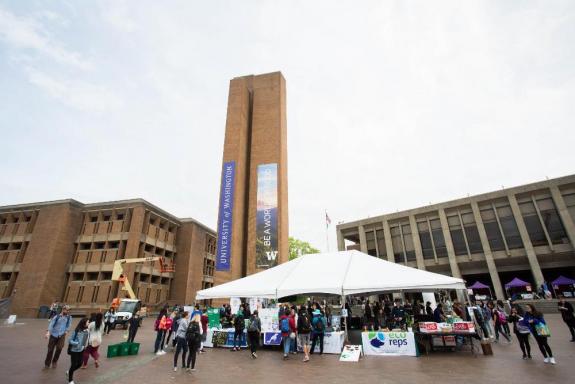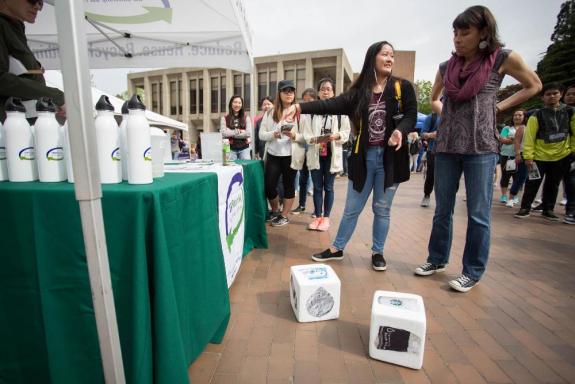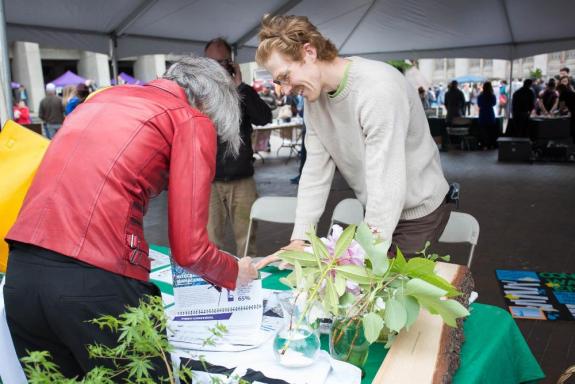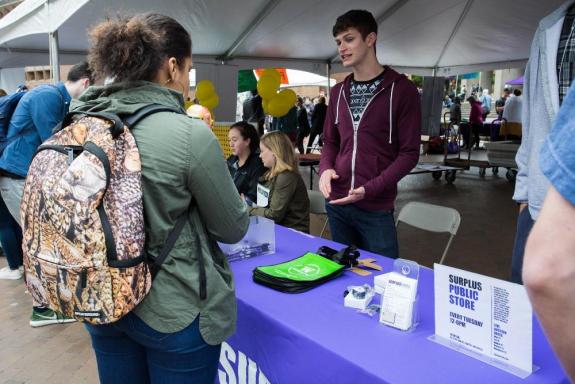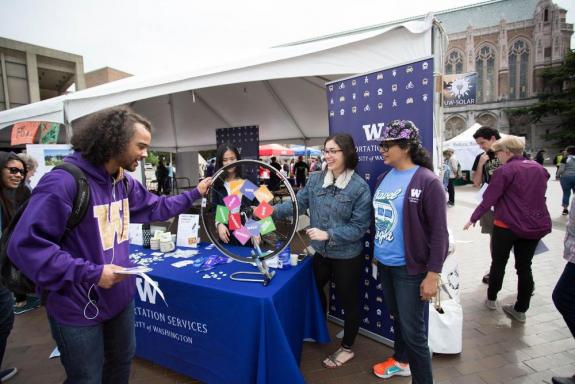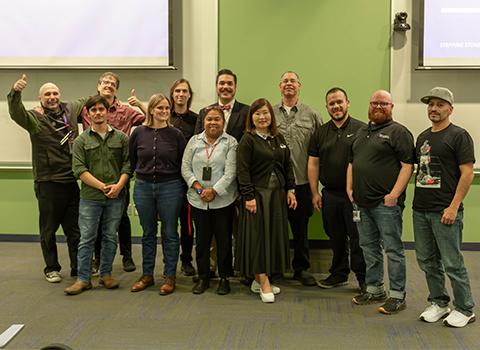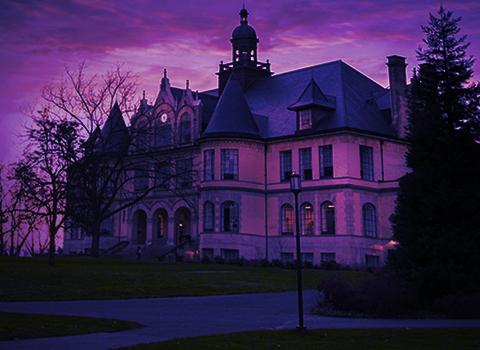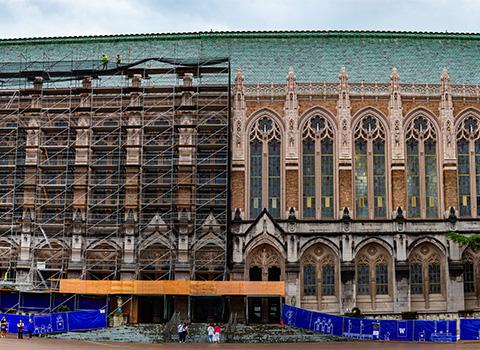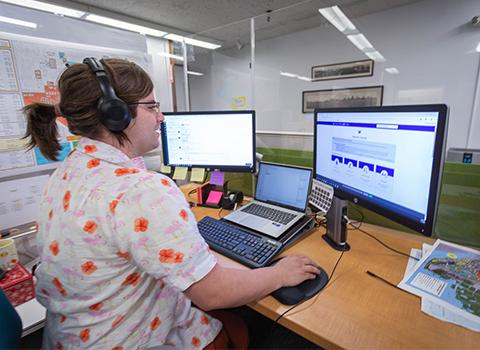Earth Day: a sustainable win
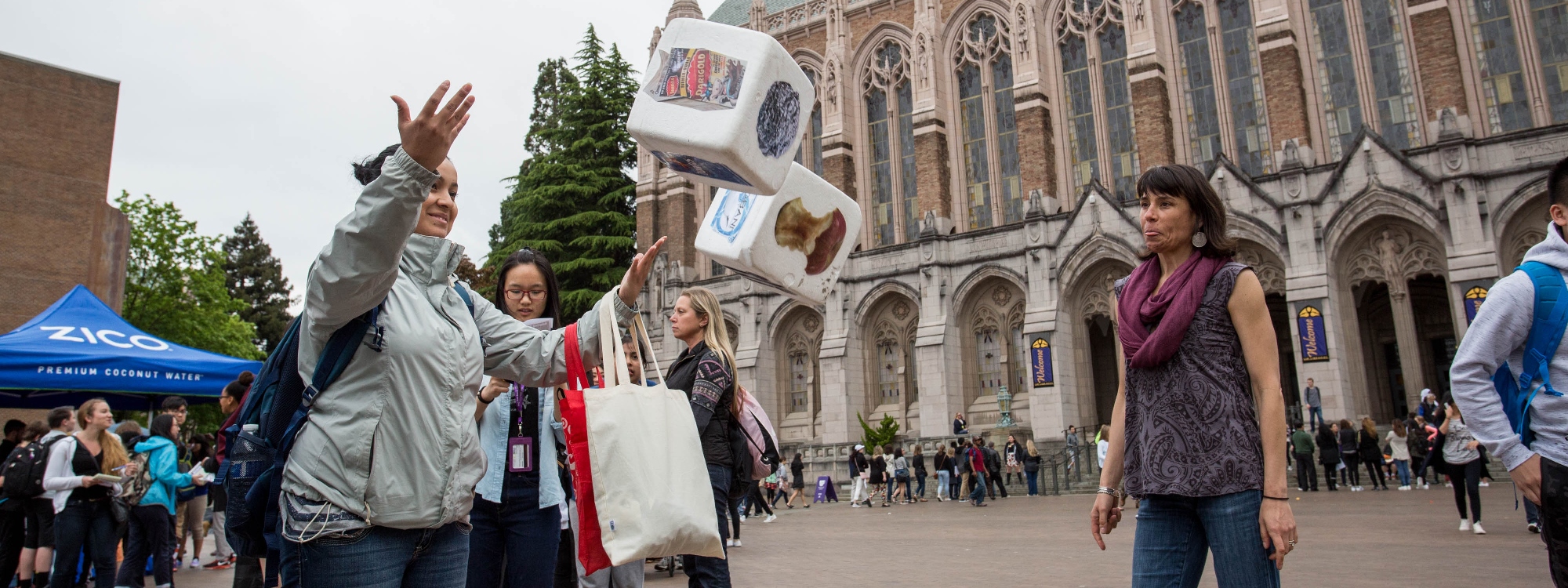
Emily Newcomer (right), the assistant director of UW Recycling, watches as a student tosses two Styrofoam dice blocks into the air during a recyclables, compostables, and trash sorting game during Earth Day in Seattle, Wash.
Emergency Management, Transportation Services, UW Surplus, Grounds Management and UW Recycling joined the celebration on Red Square this past Friday to help educate the community about their sustainable practices and programs for Earth Day.
While Earth Day officially took place on April 22, the entire week was packed with events: from campus lectures, to the UW Surplus public hours, to sustainable career meet-and-greets. UW Sustainability curated all the events on their calendar to give the community ample opportunity to “go green” ahead of Friday’s celebration.
Red Square was packed with students, community members, and young kids wandering through campus for Engineering Discovery Days. The entire area was swamped with tents hosting outreach games, trivia wheels, and free prizes.
UW Emergency Management pulled out their “Wheel of Misfortune” for another round of “Zombie” and “Whoops!” questions. After the wheel spun, the Emergency Management team educated community members about the safest practices in hazardous situations: earthquakes, zombie apocalypses, and “This or That?” situations.
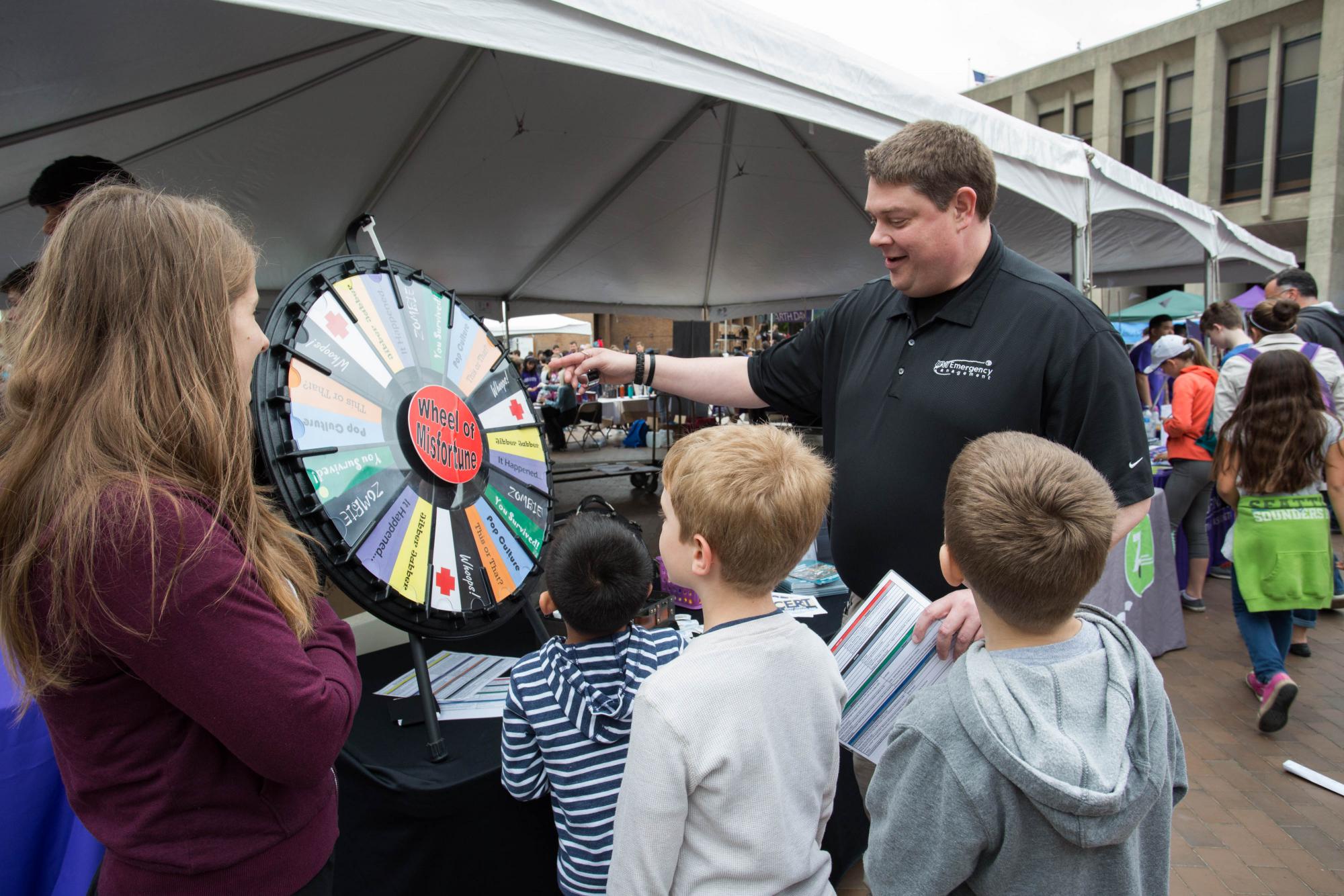
Scott Preston from UW Emergency Management helps kids spin the “Wheel of Misfortune” emergency situation game during the Earth Day celebration on Red Square in Seattle, Wash.
Red Square was even busier than normal as young kids walked through the Earth Day celebration.
Scott Preston, the business continuity manager for Emergency Management, got to experience a flood of new faces as kids from Engineering Discovery Days briefly stopped by to learn about the University.
“Any time we get to reach out to our UW community and promote disaster awareness and being prepared is a good day for us,” Preston said. “Having the Engineering Discovery Day kids there was fun, because it allowed us to speak to a different audience than our usual UW students. Some of our questions to the Engineering Discovery Day kids were along lines that bordered on the silly (‘What is YOUR plan for the Gummy Bear apocalypse?’), but we still got an ‘all-hazards’ preparation message across to them.”
Preston said that what qualifies as a disaster is “largely immaterial,” which is why using zombies and Gummy Bear apocalypses can work so well to educate younger kids about emergency preparedness.
“If you are ready for the zombies (or Gummy Bears), then you are ready for a real disaster such as a storm or an earthquake,” Preston said.
UW Recycling brought out two Styrofoam dice blocks to challenge the campus community to a sorting game. Each block was covered in pictures of recyclables, compostables, and trash. After the blocks were tossed into the air, students had the opportunity to test their sorting knowledge and win a water bottle or salad shaker.
“These events are tiring but so worth it. What other chance do we have to engage so many people at one time in recycling and composting education? Even people who are avid recyclers and composters walk away learning something new,” said Emily Newcomer, the assistant director of UW Recycling. “We always like our giveaways to emphasize reuse, and this year our focus was on providing reusable containers for lunch. Our emphasis was you need to eat healthy for mid-terms and finals, so eat a salad!”
The dice block game was a new outreach game thought up by Liz Gignilliat, a program coordinator with UW Recycling. The game encouraged not only the UW Recycling staff to get out from behind the table, but also to learn from students what items are confusing to sort.
“We needed a simple game that could be more rapid fire but also visible to draw a crowd. The Wheel of Waste reminds me of casino games, so that inspired me to look up simple card and dice games that could work,” Gignilliat said. “It was a bonus that we got to re-use Styrofoam collected from campus!”
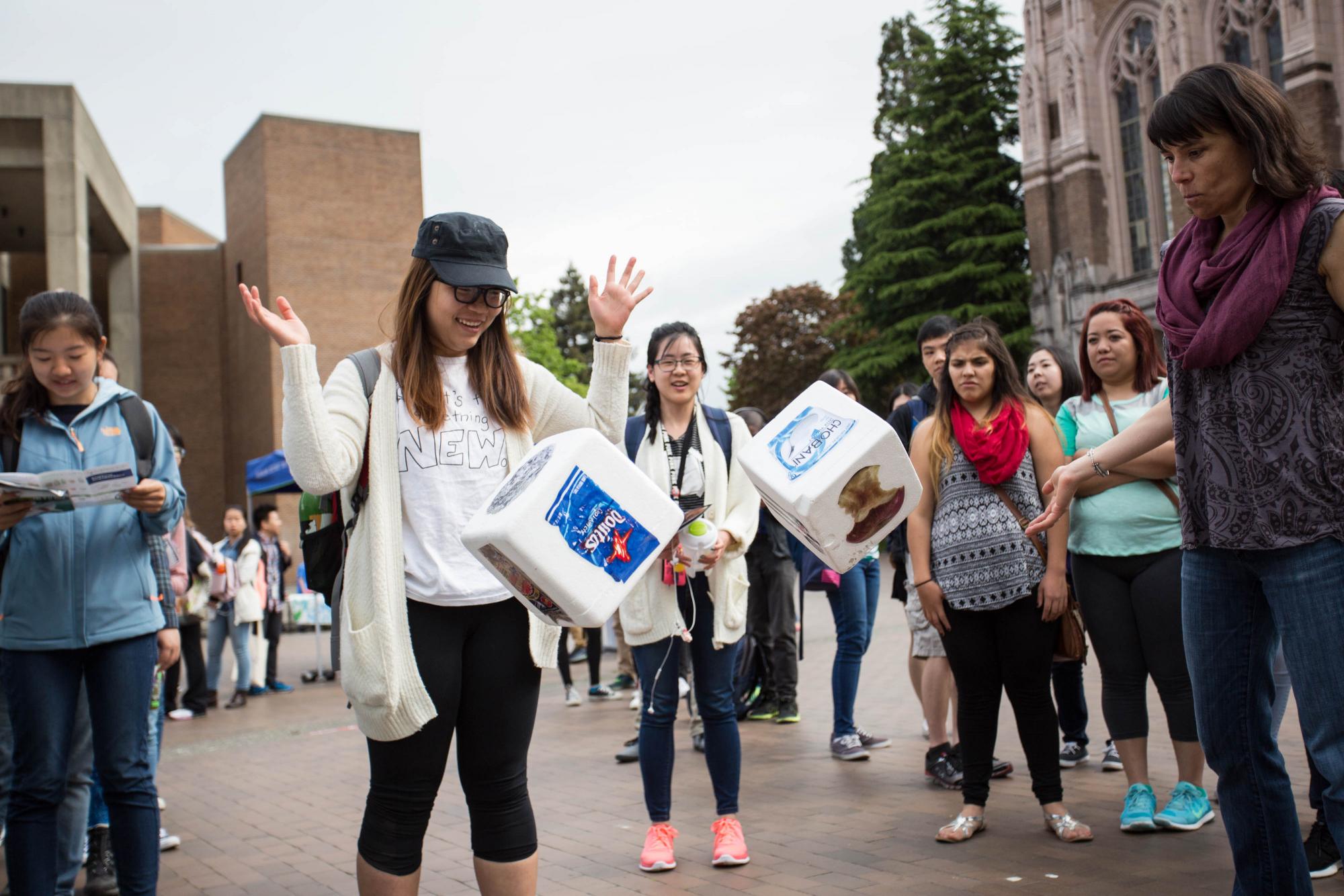
Emily Newcomer, the assistant director of UW Recycling, watches as a student tosses Styrofoam dice blocks into the air as part of a new sorting game for Earth Day in Seattle, Wash. The idea for the game was thought up by Liz Gignilliat, the program coordinator for UW Recycling, to bring a new twist to their usual outreach efforts.
Grounds Management tabled on Red Square to educate about sustainable programs happening behind-the-scenes at the University.
“I love interacting with the public and the campus community at these tabling events. My favorite part is the reaction people have when they realize all the sustainable practices already in place at Grounds Management. I don’t think people expect us to be so ‘green,’ but we are because we care about what happens around us,” said Daniel Sorensen, the IPM and sustainability coordinator at Grounds Management.
Sara Shores, Ed McKinley, and Sorensen accepted a Husky Green Award during the last portion of the Earth Day celebration. The team won for their work with the salvage wood program. The ongoing program takes trees cut down from campus, and uses the wood to make items such as tables and benches.
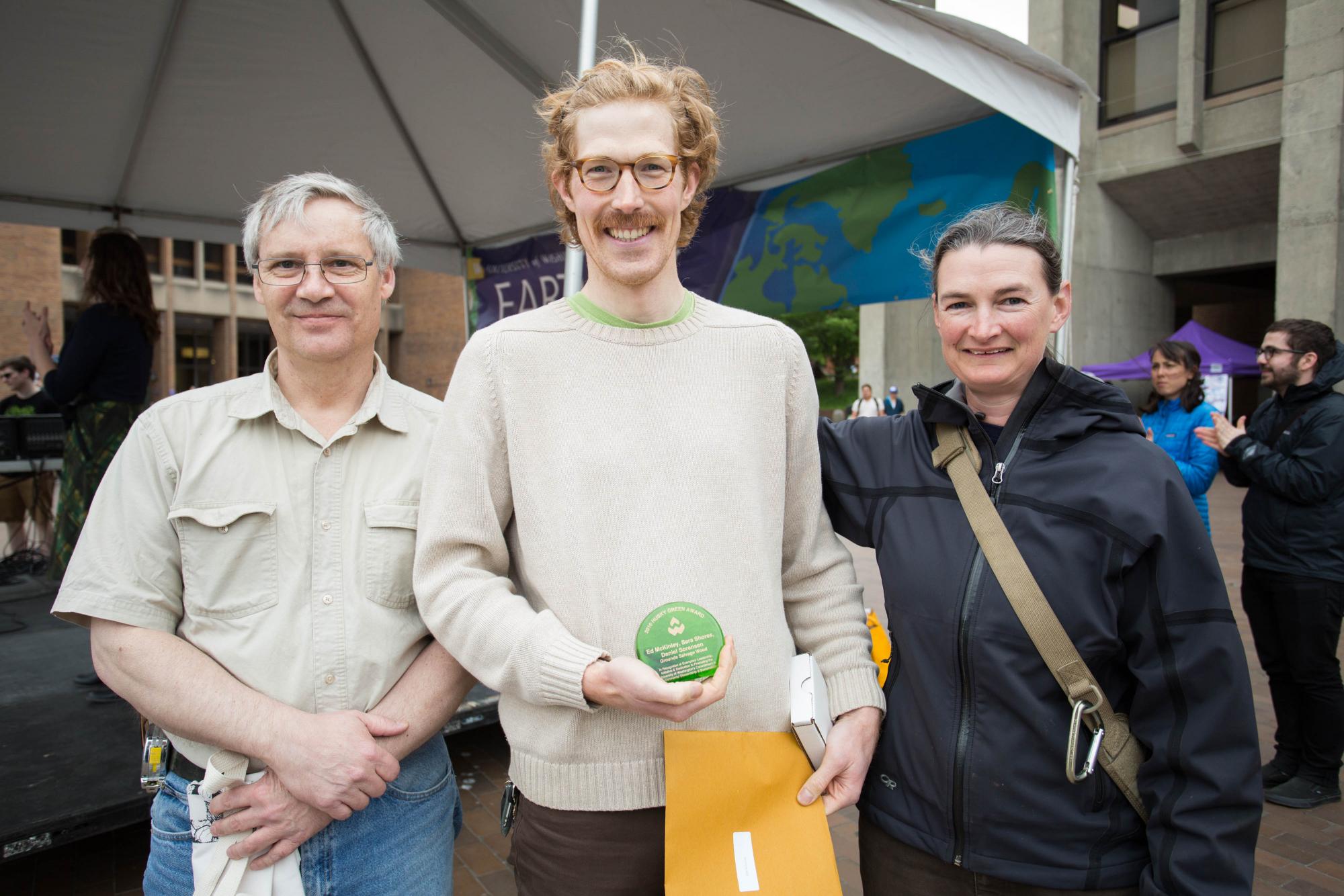
Ed McKinley, Daniel Sorensen, and Sara Shores accepted a Husky Green Award for the salvage wood program during the Earth Day celebration at Red Square in Seattle, Wash.
According to Shores, the project has been in the works since 2008.
“We all knew of the potential for the program to create another layer of sustainability in our urban forest by keeping the wood from going back to carbon in the atmosphere,” Shores said. “I’m mostly excited to see how this program unfolds after the community sees what our carpenters are capable of. I wish I could fast forward the drying process so they could start using all the wood!”
While Grounds Management has been collecting lumber, purchasing a saw mill has been in the works for a few months. It arrived earlier this year, kick-starting the beginning of the program.
“I’m looking forward to learn about the process of producing our own lumber from campus trees,” McKinley said. “The saw mill has expanded our capability and given us the opportunity to work with the Grounds Shop on interesting projects.”
While UW Surplus had public store hours earlier in the week, on Earth Day they passed out reusable totes to collect prizes for the rest of the event.
Transportation Services brought out their Bike Wheel of Fortune, tucked with colorful cards, to ask Earth Day focused trivia questions about transportation options around campus. They handed out reflective backpack key tags, U-PASS phone pockets, and light rail stickers to spread the word about transportation options on campus.
According to Miriam Castro from UW Transportation Services, the Bike Wheel of Fortune has made several appearances over the year, including at the UW Safety, Sustainability, and Preparedness Expo in February. Transportation Services switches up the questions based on the event — in this case, asking emissions and rideshare related questions to hit on Earth Day awareness.
“Our team works to promote the U-PASS as a way to get around without driving alone in a car. We highlight the fact that 82 percent of trips to campus are made by foot, bicycle, transit or rideshare,” Castro said. “There are so many great transportation resources in our area that makes it easy to get around without a car.”
While the Red Square celebration was the culmination of Earth Week, programs and practices are being done by Facilities Services employees throughout the year to promote sustainability.
